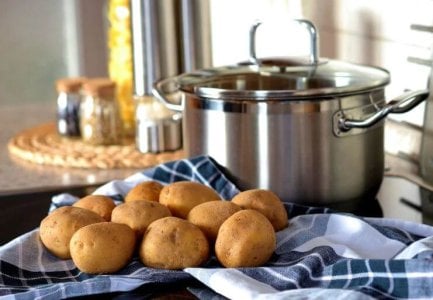This Simple Trick Will Save Your Too-Salty Dishes
- Replies 6
It’s happened to us all at some point. The feeling of disappointment when the dish you spent an hour (or hours) lovingly preparing suddenly tastes too salty.
But hope is not lost!
A mum has revealed her ‘lifesaver’ trick for saving overly salty dishes – needless to say, the internet was stunned.
In a TikTok video that’s been viewed over 6.8 million times and shared tens of thousands of times, Vanessa explained her simple, tried-and-tested method for fixing over-salted dishes.
‘Have you ever accidentally put too much salt in your food and didn’t know what to do? I’ve got a trick for you,’ she said in the clip.
Vanessa’s secret? A single peeled potato!
‘Peel a potato, add it to your soup and let it cook with it. The potato is going to absorb the excess salt,’ she said.
‘Now your dish will be served like nothing happened.’
What allegedly makes this work is the starch content in a potato. It is believed that it soaks up the salt like a sponge in minutes, and you can have your dish back to its original flavour within minutes.
The potato should be removed from the pot of soup, curry, or stew after the salty flavour has been reduced to your liking.
Many of Vanessa’s followers were amazed by the trick.
‘Oh my, you are a lifesaver! Thank you,’ one wrote, while someone else wished they saw this hack ‘two nights ago’.
‘Thanks for the info!’ They added.
Some revealed that they had known about this trick for years.
‘Yes, I have been doing this. My mom taught me,’ shared one.
Another agreed and said her parents taught her the same trick.
Others were not impressed with the hack.
‘I tried it, this didn’t work,’ someone shared.
While one explained that potatoes do not absorb salt, they absorb water.
Some shared their methods for neutralising the saltiness of a dish.
‘I learned putting in a little sugar works too! I know it sounds weird but it does the job with no hassle,’ one viewer commented.
Adding something acidic, like lemons, could also neutralise the dish’s saltiness according to one social media user.
You can watch Vanessa’s ‘hack’ below:
Though American Chemist and Professor Emeritus of Chemistry at the University of Pittsburgh put this to the test in a past experiment and revealed that this hack ‘doesn’t really work’.
According to him, while the potato does absorb some of the liquid – and by extension the salty taste itself – potatoes can’t actually remove excess salt. Moreover, he tested the salinity of the salted water (which he used for the experiment) before and after the potatoes were added.
He concluded that ‘there was no detectable difference in the salt concentrations before and after being simmered with potato’.
‘The potato trick just doesn’t work,’ he said.
Perhaps it’s a placebo effect then?
So if using a peeled potato doesn’t work, there are still other methods that can be used to reduce salt in food. For example, adding more liquid or other ingredients to the dish can help dilute the saltiness. Adding ingredients that are high in moisture like vegetables, tomato puree, or coconut milk can also help bring balance to the dish. If the savoury flavours of the dish are already overpowering the saltiness, you can try adding a small amount of something sweet like a bit of sugar, honey, or even a splash of something acidic (as suggested by a commenter) like white vinegar or lemon juice to bring out the other flavours.
One of the simplest, yet often overlooked, ways to prevent over-salting your food is to season judiciously, and in stages. This will allow you to end up with a dish that is flavorful and balanced, rather than overly salty. Before adding any salt, first taste the dish and adjust any other seasoning, such as adding herbs and spices. Once that is done, add small amounts of salt and taste after each addition before adding more. This method makes it much easier to gauge how much salt is the right amount to use.
Reducing the amount of salt in food usually requires trial and error. Each dish is different, so it may take a few tries before you find the perfect balance. However, taking the time to experiment will be worth it in the long run, as it will help to ensure that your dishes are always perfectly seasoned and delicious.
 Did you know about this ‘trick’, members? Do you have tips for saving a salty dish? Let us know your thoughts in the comments below!
Did you know about this ‘trick’, members? Do you have tips for saving a salty dish? Let us know your thoughts in the comments below!
But hope is not lost!
A mum has revealed her ‘lifesaver’ trick for saving overly salty dishes – needless to say, the internet was stunned.
In a TikTok video that’s been viewed over 6.8 million times and shared tens of thousands of times, Vanessa explained her simple, tried-and-tested method for fixing over-salted dishes.
‘Have you ever accidentally put too much salt in your food and didn’t know what to do? I’ve got a trick for you,’ she said in the clip.
Vanessa’s secret? A single peeled potato!
‘Peel a potato, add it to your soup and let it cook with it. The potato is going to absorb the excess salt,’ she said.
‘Now your dish will be served like nothing happened.’
What allegedly makes this work is the starch content in a potato. It is believed that it soaks up the salt like a sponge in minutes, and you can have your dish back to its original flavour within minutes.
The potato should be removed from the pot of soup, curry, or stew after the salty flavour has been reduced to your liking.
Many of Vanessa’s followers were amazed by the trick.
‘Oh my, you are a lifesaver! Thank you,’ one wrote, while someone else wished they saw this hack ‘two nights ago’.
‘Thanks for the info!’ They added.
Some revealed that they had known about this trick for years.
‘Yes, I have been doing this. My mom taught me,’ shared one.
Another agreed and said her parents taught her the same trick.
Others were not impressed with the hack.
‘I tried it, this didn’t work,’ someone shared.
While one explained that potatoes do not absorb salt, they absorb water.
Some shared their methods for neutralising the saltiness of a dish.
‘I learned putting in a little sugar works too! I know it sounds weird but it does the job with no hassle,’ one viewer commented.
Adding something acidic, like lemons, could also neutralise the dish’s saltiness according to one social media user.
You can watch Vanessa’s ‘hack’ below:
Though American Chemist and Professor Emeritus of Chemistry at the University of Pittsburgh put this to the test in a past experiment and revealed that this hack ‘doesn’t really work’.
According to him, while the potato does absorb some of the liquid – and by extension the salty taste itself – potatoes can’t actually remove excess salt. Moreover, he tested the salinity of the salted water (which he used for the experiment) before and after the potatoes were added.
He concluded that ‘there was no detectable difference in the salt concentrations before and after being simmered with potato’.
‘The potato trick just doesn’t work,’ he said.
Perhaps it’s a placebo effect then?
So if using a peeled potato doesn’t work, there are still other methods that can be used to reduce salt in food. For example, adding more liquid or other ingredients to the dish can help dilute the saltiness. Adding ingredients that are high in moisture like vegetables, tomato puree, or coconut milk can also help bring balance to the dish. If the savoury flavours of the dish are already overpowering the saltiness, you can try adding a small amount of something sweet like a bit of sugar, honey, or even a splash of something acidic (as suggested by a commenter) like white vinegar or lemon juice to bring out the other flavours.
One of the simplest, yet often overlooked, ways to prevent over-salting your food is to season judiciously, and in stages. This will allow you to end up with a dish that is flavorful and balanced, rather than overly salty. Before adding any salt, first taste the dish and adjust any other seasoning, such as adding herbs and spices. Once that is done, add small amounts of salt and taste after each addition before adding more. This method makes it much easier to gauge how much salt is the right amount to use.
Reducing the amount of salt in food usually requires trial and error. Each dish is different, so it may take a few tries before you find the perfect balance. However, taking the time to experiment will be worth it in the long run, as it will help to ensure that your dishes are always perfectly seasoned and delicious.
Key Takeaways
- A mum has shared a viral TikTok video explaining how a peeled white potato can be used to draw out the excess salt from a dish.
- The potato will act like a sponge and absorb the salt in just minutes.
- Not everyone was convinced, with some suggesting other ingredients to use to balance out the flavours of the dish.









